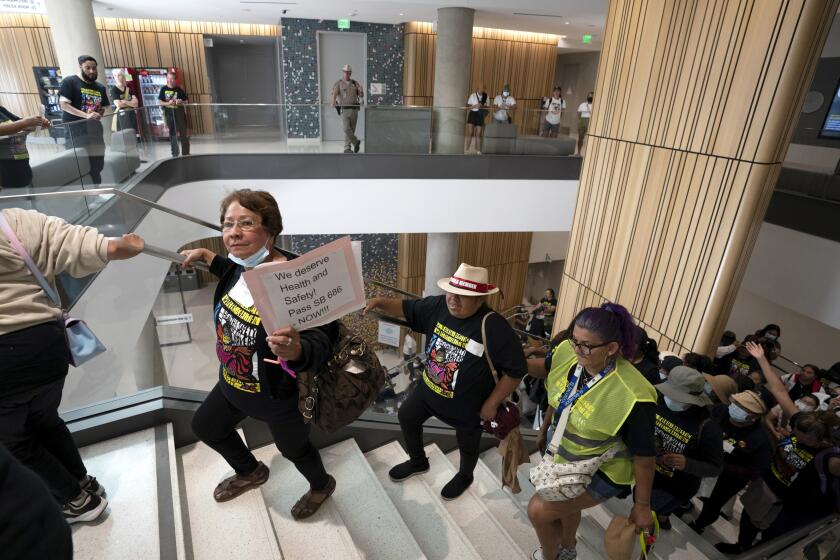Newsom vetoes bill to expand worker layoff protections to contract labor

California Gov. Gavin Newsom vetoed a bill Sunday that would have extended the notice period of impending layoffs that companies are required to give employees and expanded these rules to contract workers.
Including contract labor under the California Worker Adjustment and Retraining Notification, or WARN, Act, “risks imposing liability” on employers who “cannot reasonably be expected to know whether their actions will cause job loss for employees of their subcontractors,” Newsom said in his veto statement.
The legislation was created by Assembly member Matt Haney (D-San Francisco) in response to the wave of layoffs that swept the tech industry last year, particularly Twitter, now known as X.
The Elon Musk-acquired social media company reportedly laid off about 4,400 of its 5,500 contract workers without notice or severance, after already laying off about 3,700 of its full-time employees. The company is locked in a legal tussle over not cooperating in arbitration cases with former employees who say the company hasn’t paid them severance.
The large number of contract workers in the tech industry is expected to grow in the next few years, especially those working with artificial intelligence programs capable of creating images and other content.
As tech giants lay off scores of workers amid a sector-wide downturn, employees who once considered the Silicon Valley companies a safe long-term bet are reconsidering their allegiances.
“If we want to keep our work force here in California then we have to make sure that all workers — from the software engineers to the janitors and cafeteria workers — get sufficient notice when a company is downsizing instead of kicking them out overnight,” Haney said in a news release.
Samantha Gordon, chief program officer at TechEquity Collaborative, which sponsored the bill, called expanding protections to contract workers a “straightforward change that addresses the way that work happens today.”
Employers enter into contracts with agencies with a “rough idea,” of the work they’re paying for, Gordon said, and if contract workers are being laid off, it generally means the employer has told the agency that it can no longer afford to pay those workers.
“It’s reasonable that anyone employed … by that company has the right to be informed of a potential job loss as a result of a mass layoff,” Gordon said.
The bill would have extended the WARN-required notice period of impending layoffs, closure or relocation — which applies to companies of a certain size — to 75 days from 60 days. For the rules to apply to employees of labor contractors, they would have been required to work at least six of the 12 months and at least 60 hours preceding the date on which a mass layoff notice is required. Employees of a labor contractor completing a temporary project with a defined end date would have been exempt.
Newsom also questioned the bill’s expansion of the kinds of companies that would be subject to the WARN Act to include chain businesses, even when such layoffs might be geographically far apart and unrelated.
Gov. Gavin Newsom vetoed a bill that would have given housekeepers, nannies and other domestic workers OSHA rights
“It is not clear that this change is consistent with the purpose of [the WARN Act] to protect local communities and enable a rapid response to a potential shock to a local economy and workforce,” Newsom said.
Haney said he plans to reintroduce the bill next year and work with Newsom to address his concerns. The bill was sponsored by several union and labor groups in the state such as the California Labor Federation, National Employment Law Project, and Alphabet Workers Union, which represents Google employees.
More to Read
Inside the business of entertainment
The Wide Shot brings you news, analysis and insights on everything from streaming wars to production — and what it all means for the future.
You may occasionally receive promotional content from the Los Angeles Times.













